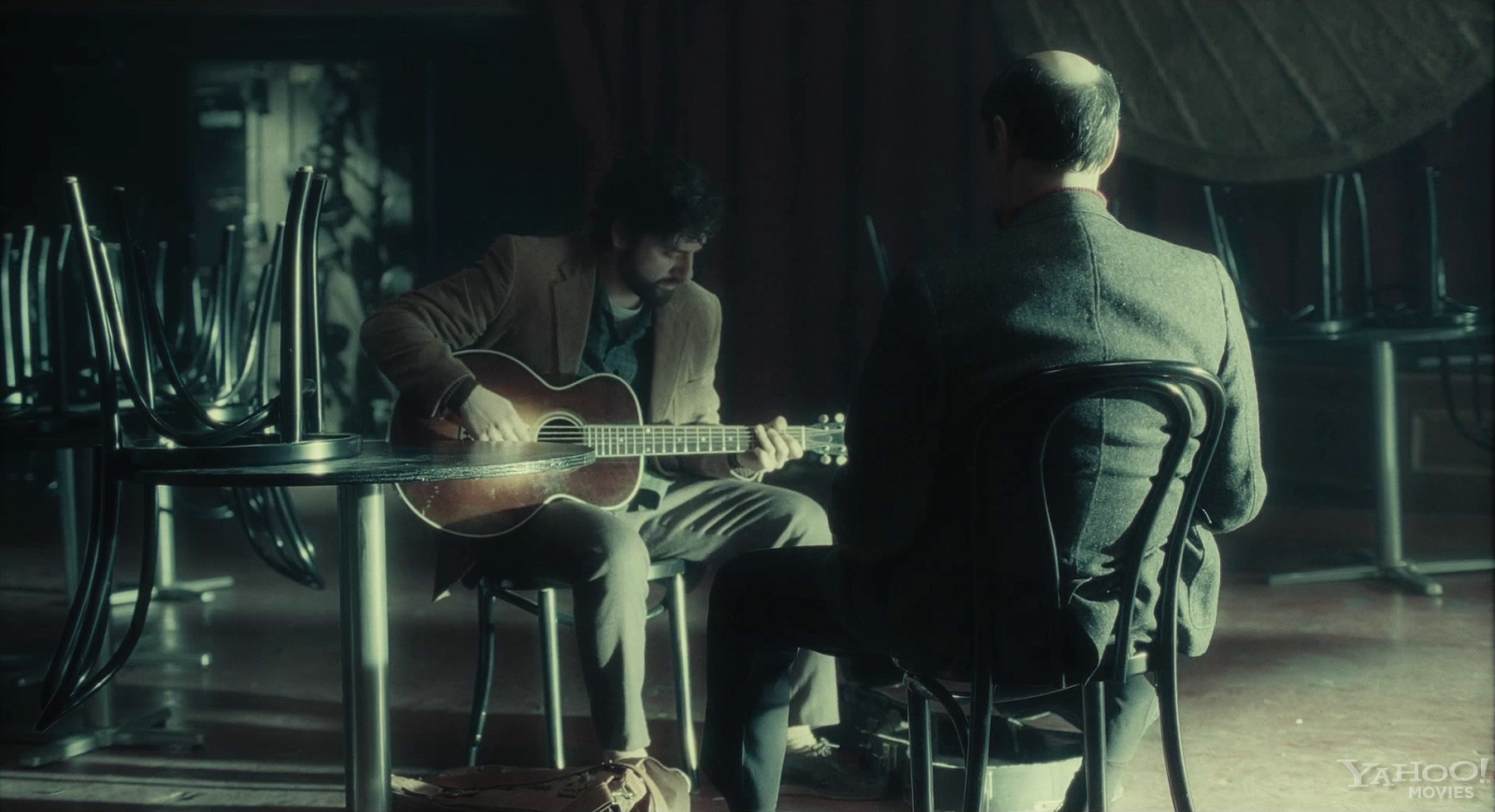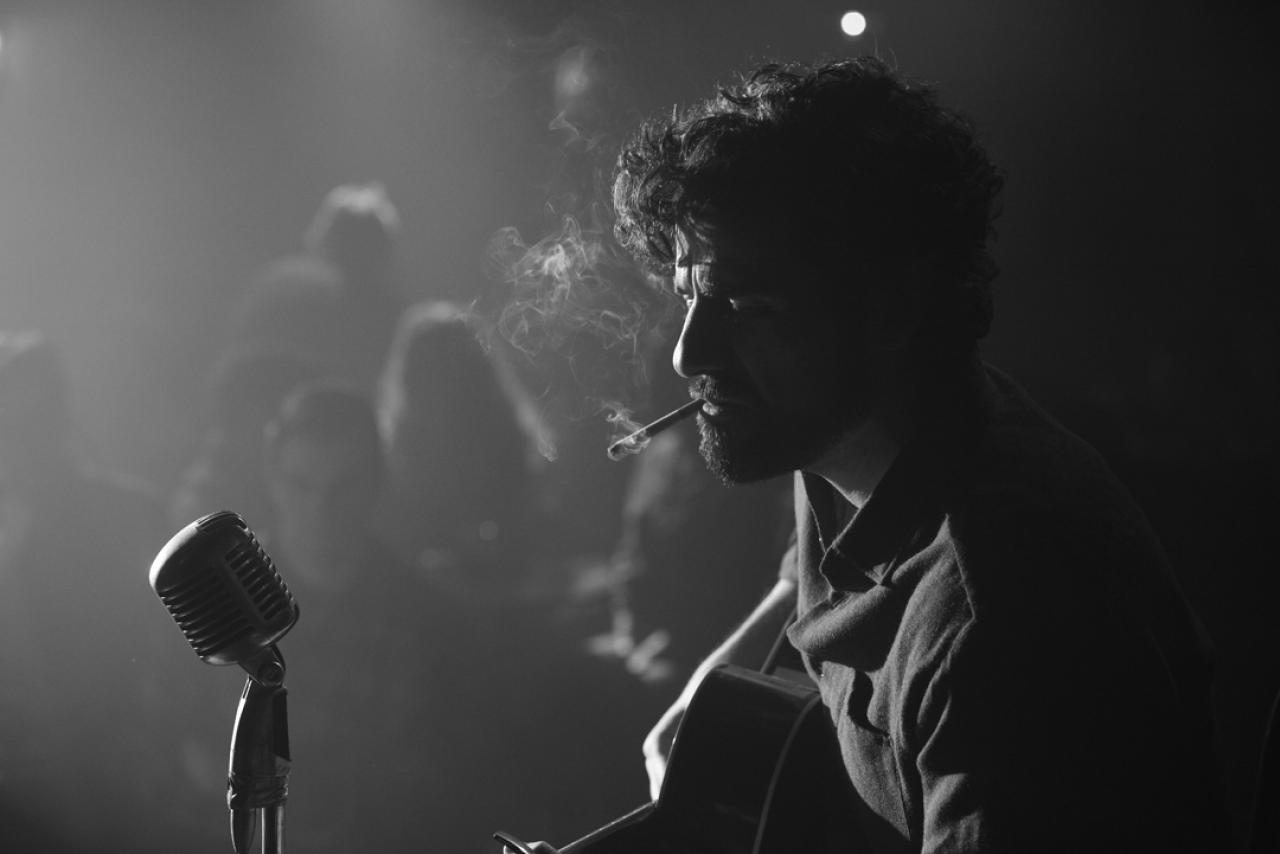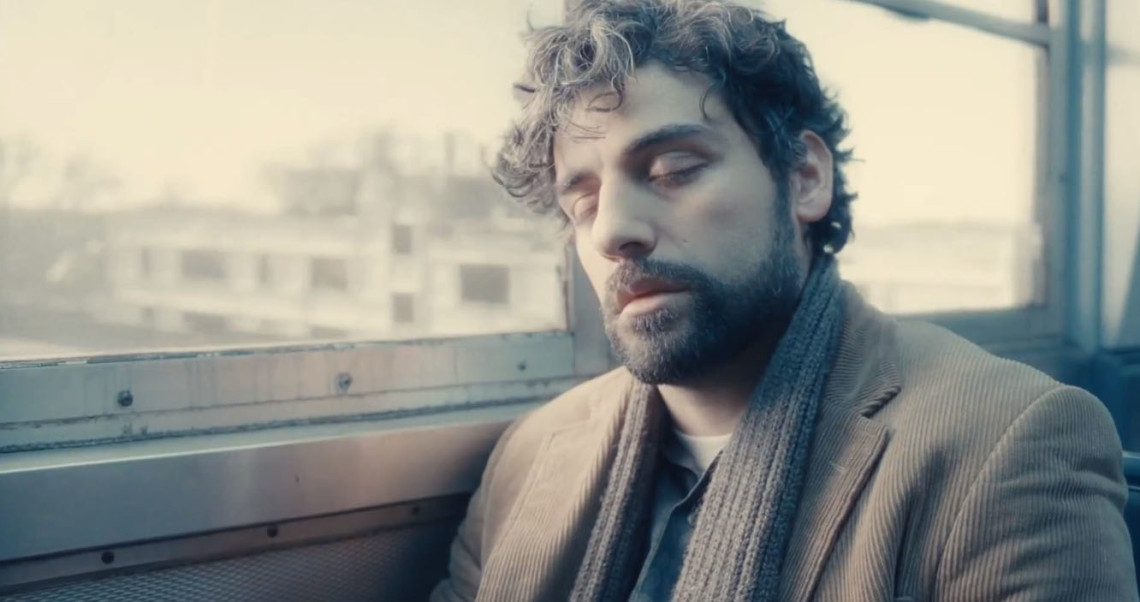With its dim blues, browns, and greens, it would be easy to mistake Inside Llewyn Davis for a chilly film. In fact, it is a cold film, at least by its snow-laden setting. Llewyn Davis trudges through the wintry streets of New York and Chicago in a weathered jacket. His shoes are soaked with water and his scarf barely provides relief from the palpably crisp air. Bruno Delbonnel, the film’s Oscar-nominated director of photography, applies his typically hazy gaze to painterly effect. The environment Llewyn inhabits is unforgiving, but the soft glow of Delbonnel’s images makes the world a touch more hospitable and cozy for the audience, if not Llewyn himself.
“‘Exist?’ That’s what we do outside of show business? It’s not so bad, existing.”
If the Coen brothers, Joel and Ethan, have any overriding concern, it’s the matter of existing. More specifically, existing in an uncaring and absurd world, and the cosmic joke inherent. This singular focus has long been a matter of debate, leaving many critics in awe and some aghast at the cruelty of the Coens’ vision. They have been cruel, unquestionably. Characters in so many of their films are put through the wringer, with no real consideration of what they deserve. Of course, deserving is the purview of God, and the Coens leave God absent—at least in intention. The ebbs and flows of any particular moment exhibit no reason except unreason. Such is their dealing in unkind adversity and its unexpectedness; simply existing becomes a trial worth watching.
Whether or not the Coens have ever “cared” about their characters—and they certainly have—Inside Llewyn Davis finds the notoriously nihilistic filmmakers riding down a directly emotional path begun in part with No Country for Old Men, and in earnest in A Serious Man. In both films, and even more so in the subsequent True Grit, the hardship of being is met with clear empathy rather than the usual reserved amusement. The Coens have displayed this tendency in the past, but their recent films have seen a trend toward a deeper emotional weight than they’ve been given credit for in the past. The Coen brothers are not supposed to make you cry, but there they are, having Hailee Steinfeld’s Mattie Ross beg LaBoeuf to stay, and the tears come streaming.
Inside Llewyn Davis shares a lot with True Grit, including a main character who has little trouble alienating everyone in his vicinity, and whose understanding of his station is out of whack with what the world deems him worthy. Llewyn Davis is a folk singer in 1961, surfing the couches of Greenwich Village apartments, searching for an imagined ideal of creative fulfillment and money to pay rent. He’s an artist—whatever that means—and he refuses to see himself as anything less. Nothing less would do, even though his talent or piecemeal success is never clear enough to warrant his haughty attitude. If Llewyn has a defining character flaw, it’s that he believes he deserves something from the world. That such an expectation is bound to remain unfulfilled in a Coen brothers film is obvious. Less obvious is that despite not really deserving anything, the film invites us to wish he did.

Several times in the film, Llewyn, played by the incredible Oscar Isaac, sings songs in full. Adam Nayman, writing in CinemaScope when the film was released in 2013, said of Isaac’s portrayal, “it’s a testament to the complexity of the Coens’ design that the actor succeeds astonishingly well while simultaneously implying that the character may not be as great as he thinks he is.” This dual function is what allows the audience to feel sympathy for Llewyn, as well as empathy for his struggle. As he sings those beautiful words to “The Death of Queen Jane,” you’d be forgiven for stopping to catch your breath, so beautiful is his performance. At the same time, F. Murray Abraham, Patron Saint of Mediocrity himself, is totally warranted when, as Bud Grossman, he tells Llewyn, “I don’t see a lot of money here.” So goes the tragedy of Llewyn’s existence.
It’s not unusual for the Coens to play up the comedy in tragedy, and in Inside Llewyn Davis they take their shots aplenty. It could be said that the whole film is little more than a witty riff off of Bob Dylan’s arrival on the Greenwich Village folk scene. To take the joke of it all on its own, though, is to entirely miss the subject of the Coens’ interests. For a film that has no real plot—“Or There and Back Again” would have been a highly appropriate subtitle—the journey, as they say, is what matters; the setup to the punchline is more important than anything. Llewyn’s performance of “Shoals of Herring” for his invalid father, on the surface, is an excuse for a fairly cruel poop joke; but in fact, it recalls his childhood when the music wasn’t attached to his success or failure. It’s also a direct appeal to his roots, to the authenticity he prizes in his music, and to his sick father sitting there before him, “existing.”
Or look back to “The Death of Queen Jane,” a terrible choice of song to play for a producer, as the music experts in the Criterion Collection’s commentary track point out, if Llewyn’s intention is to actually get hired. But it’s also a heartfelt choice, expressing the sadness at the life he might’ve had with the child he will never know. He may not have the ineffable quality of greatness, but music is more than that, and so is life. It explains, to an extent, his relentless alienation and in turn why he pushes people away. Llewyn is a selfish asshole, and while that’s not exactly forgivable, it’s also not all that he is.
The structure of the film plays right into its empathy. Taking a page out of many great folk songs, the picture is very nearly circular. It opens with Llewyn playing the Gaslight, singing “Hang Me, Oh Hang Me”—a song there’s no way this young, good-looking ‘60s hipster has any business trying to make his own. When he gets beat up in the alley afterward, we don’t know why, but we get the feeling he probably deserves it. The film ends with the same scene, but now we understand a lot more—on the one hand, that, yeah, Llewyn did deserve the beating he got. But it hardly invalidates the trials he’s been subjected to.

The beating is precipitated by Llewyn’s heckling of the attacker’s wife the night before. His reasons? Petty, misdirected, but deeply felt. It comes from the pain he feels over learning the woman he loves, who he can’t properly be with, traded sexual favors to get him a gig at the Gaslight the following night. In fact, much of the film’s heart rests with that woman, Jean.
There’s a scene late in the film between Llewyn and Carey Mulligan’s Jean. They’ve been at odds the entire film, with Llewyn in the position of arranging an abortion for her after they’ve slept together. Whatever animosity exists between them subsides momentarily as Jean’s exasperation with Llewyn finally breaks down and the two relate to each other as friends. The scene is at the center of the film’s expression of the compassion for and between its characters. It’s a scene that makes me cry for all its sadness and beauty. Jean tells him she’s gotten him the Gaslight slot, and he refuses. “I’m out,” he says to her, “I’m done.” He tells her he’ll be going back into the Merchant Marine. She tries to convince him to keep at the music, that the Times will be there. He refuses anyway.
“I’m sorry. I’m sorry—thanks for the thought, but it’s not going anywhere. And I’m tired,” he says.
“You’re tired?”
“I’m so fucking tired. I thought I just needed a night’s sleep, but it’s… it’s more than that. But thank you. For trying,” his voice cracking. “I love you.”
“Come on,” rolling her eyes.
So much is contained in that scene, as is true of the film as a whole. The bleak, cold sadness of existing. The tiring weight of it all. And yet it’s tempered by a caring and unexpected kindness that runs through to its core. Inside Llewyn Davis is a miracle of sorts, a deeply bittersweet film whose heart and humanity give warm respite in the cold.
Inside Llewyn Davis is now available on DVD and Blu-ray from The Criterion Collection.

















